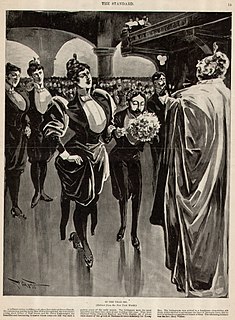Related Research Articles
Ethical egoism is the normative ethical position that moral agents ought to act in their own self-interest. It differs from psychological egoism, which claims that people can only act in their self-interest. Ethical egoism also differs from rational egoism, which holds that it is rational to act in one's self-interest. Ethical egoism holds, therefore, that actions whose consequences will benefit the doer are ethical.

Ethics or moral philosophy is a branch of philosophy that "involves systematizing, defending, and recommending concepts of right and wrong behavior". The field of ethics, along with aesthetics, concerns matters of value; these fields comprise the branch of philosophy called axiology.

John Stuart Mill, also cited as J. S. Mill, was an English philosopher, political economist, Member of Parliament (MP) and civil servant. One of the most influential thinkers in the history of classical liberalism, he contributed widely to social theory, political theory, and political economy. Dubbed "the most influential English-speaking philosopher of the nineteenth century", he conceived of liberty as justifying the freedom of the individual in opposition to unlimited state and social control.

A slippery slope argument (SSA), in logic, critical thinking, political rhetoric, and caselaw, is an argument in which a party asserts that a relatively small first step leads to a chain of related events culminating in some significant effect. The core of the slippery slope argument is that a specific decision under debate is likely to result in unintended consequences. The strength of such an argument depends on whether the small step really is likely to lead to the effect. This is quantified in terms of what is known as the warrant. This type of argument is sometimes used as a form of fearmongering in which the probable consequences of a given action are exaggerated in an attempt to scare the audience, although, differentiation is necessary, since, in other cases, it might be demonstrable that the small step will likely lead to an effect.
A precedent is a principle or rule established in a previous legal case that is either binding on or persuasive without going to courts for a court or other tribunal when deciding subsequent cases with similar issues or facts. Common-law legal systems place great value on deciding cases according to consistent principled rules, so that similar facts will yield similar and predictable outcomes, and observance of precedent is the mechanism by which that goal is attained. The principle by which judges are bound to precedents is known as stare decisis. Common-law precedent is a third kind of law, on equal footing with statutory law and subordinate legislation - in UK parlance - or regulatory law.
Utilitarianism is a family of normative ethical theories that prescribe actions that maximize happiness and well-being for all affected individuals.
Integrity is the practice of being honest and showing a consistent and uncompromising adherence to strong moral and ethical principles and values. In ethics, integrity is regarded as the honesty and truthfulness or accuracy of one's actions. Integrity can stand in opposition to hypocrisy, in that judging with the standards of integrity involves regarding internal consistency as a virtue, and suggests that parties holding within themselves apparently conflicting values should account for the discrepancy or alter their beliefs. The word integrity evolved from the Latin adjective integer, meaning whole or complete. In this context, integrity is the inner sense of "wholeness" deriving from qualities such as honesty and consistency of character. As such, one may judge that others "have integrity" to the extent that they act according to the values, beliefs and principles they claim to hold.

The original position (OP), often referred to as the veil of ignorance, is a thought experiment used for reasoning about the principles that should structure a society based on solidarity. The phrases original position and veil of ignorance were coined by the American philosopher John Rawls, but the thought experiment itself was developed by William Vickrey and John Harsanyi in earlier writings.

A Theory of Justice is a 1971 work of political philosophy and ethics by the philosopher John Rawls, in which the author attempts to provide a moral theory alternative to utilitarianism and that addresses the problem of distributive justice. The theory uses an updated form of Kantian philosophy and a variant form of conventional social contract theory. Rawls's theory of justice is fully a political theory of justice as opposed to other forms of justice discussed in other disciplines and contexts.
The Faurisson affair was an academic controversy following publication of a book, Mémoire en défense (1980), by French professor Robert Faurisson, a Holocaust denier. The scandal largely related to the inclusion of an essay by American linguist Noam Chomsky, entitled "Some Elementary Comments on the Rights of Freedom of Expression", as an introduction to Faurisson's book, without Chomsky's knowledge or explicit approval. Responding to a request for comment while Faurisson was being widely attacked for his book, Chomsky defended Faurisson's right to express and publish his opinions on the grounds that freedom of speech must be extended to all viewpoints, no matter how unpopular or fallacious. The affair generated controversy among scholars both in France and the United States.

Anarchy, State, and Utopia is a 1974 book by the American political philosopher Robert Nozick. It won the 1975 US National Book Award in category Philosophy and Religion, has been translated into 11 languages, and was named one of the "100 most influential books since the war" (1945–1995) by the UK Times Literary Supplement.
Francis Macdonald Cornford was an English classical scholar and translator. He was known for influential work on ancient philosophy, notably Plato, Parmenides, Thucydides, and ancient Greek religion. Frances Cornford, his wife, was a noted poet. Due to the similarity in their names, he was known in the family as "FMC" and his wife as "FCC".

Reflections on the Revolution in France is a political pamphlet written by the Irish statesman Edmund Burke and published in November 1790. It is fundamentally a contrast of the French Revolution to that time with the unwritten British Constitution and, to a significant degree, an argument with British supporters and interpreters of the events in France. One of the best-known intellectual attacks against the French Revolution, Reflections is a defining tract of modern conservatism as well as an important contribution to international theory. The Norton Anthology of English Literature describes Reflections as becoming the "most eloquent statement of British conservatism favoring monarchy, aristocracy, property, hereditary succession, and the wisdom of the ages." Above all else, it has been one of the defining efforts of Edmund Burke's transformation of "traditionalism into a self-conscious and fully conceived political philosophy of conservatism".
Antitheism, sometimes spelled anti-theism, is the opposition to theism. The term has had a range of applications. In secular contexts, it typically refers to direct opposition to the belief in any deity.
Antiochus of Ascalon was an Academic philosopher. He was a pupil of Philo of Larissa at the Academy, but he diverged from the Academic skepticism of Philo and his predecessors. He was a teacher of Cicero, and the first of a new breed of eclectics among the Platonists; he endeavoured to bring the doctrines of the Stoics and the Peripatetics into Platonism, and stated, in opposition to Philo, that the mind could distinguish true from false. In doing so, he claimed to be reviving the doctrines of the Old Academy. With him began the phase of philosophy known as Middle Platonism.
The Moderate objectivism account of moral principles is based on the ethics of Sir William David Ross (1877–1940). Moderate objectivism adheres to basic notions of the Natural Law Theory. W. D. Ross refers to these moderate objectivists' accounts of moral principles as “prima facie principles” which are valid rules of action that one should generally adhere to but, in cases of moral conflict, may be overridable by another moral principle, hence the moderation.
Gordon Johnson, FRAS is a British historian of colonial India.

Letters to a Young Contrarian is Christopher Hitchens' contribution, released in 2001, to the Art of Mentoring series published by Basic Books.
Several alternatives to the Ten Commandments have been promulgated by different persons and groups, which intended to improve on the lists of laws known as the Ten Commandments that appear in the Bible. Lists of these kinds exist in many different cultures and times. They are sometimes given names – for example, the Hindu Yamas.
Hitchens's razor is an epistemological razor expressed by and named after journalist, author, and public speaker Christopher Hitchens (1949–2011). Hitchens has phrased the razor in writing as "What can be asserted without evidence can also be dismissed without evidence." It implies that the burden of proof regarding the truthfulness of a claim lies with the one who makes the claim; if this burden is not met, then the claim is unfounded, and its opponents need not argue further in order to dismiss it. Hitchens used this phrase specifically in the context of refuting religious belief.
References
- ↑ Wilson, Francis Graham (31 August 2013). A Theory of Public Opinion. p. 159. ISBN 978-1412815017.
- ↑ Hitchens, Christopher. Letters to a Young Contrarian. Basic Books, 2001, p. 43-44.